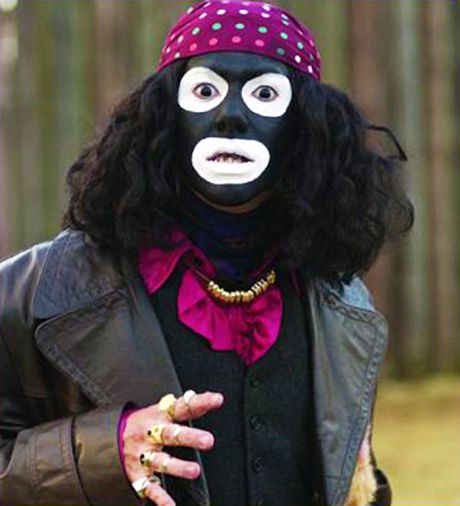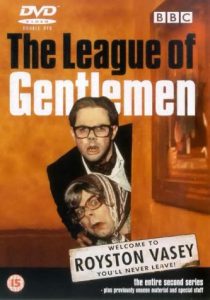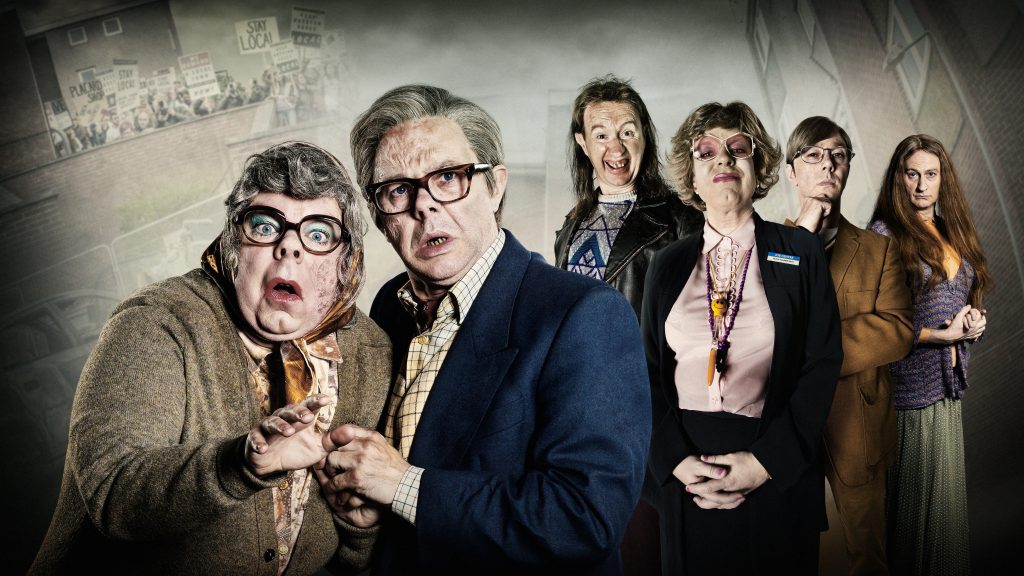Are You Local?
The Grotesque Genius of The League of Gentlemen
Posted By
Charlie Farnsbarns
On
In
North American New Right
| Comments Disabled
Monty Python’s Flying Circus sent a shockwave through 1960s England as its anarchic and surrealist comedy completely overturned televisual orthodoxy. The show was the result of a collaboration between a group of supremely talented, middle-class Englishmen (and one American) who, whilst challenging the norms of mainstream comedy, still kept the irony and biting satire that have always been the staple of English comedy at its core.
Their influence on later English comedy shows cannot be overstated. The so-called “Alternative Comedy” scene of the 1980s mixed the surrealism of Monty Python with anti-Thatcherite Leftism, producing equally original series such as The Young Ones.
But Monty Python has never really had a successor in terms of such groundbreaking comedy. Whilst the Alternative Comedy era had some gems, it also produced some woefully unfunny “comedians” like Alexei Sayle and Keith Allen. The series The Comic Strip Presents . . . was written by and featured most of the Alternative Comedy hierarchy. When it was good, it was very good. But as with the Alternative Comedy scene in general, it was so mired in Leftist politics that unless you were a denizen of that scene, a lot of the comedy simply came across as Marxist proselytizing.
It wouldn’t be until the late 1990s and early 2000s that Python’s mantle was genuinely passed on to The League of Gentlemen. Like the Python team, it was written by and starred a group of middle-class Englishmen (no Yankee this time) who met at college and began to write comedy together. Like Python, The League of Gentlemen is very surreal and often quite shocking. But whereas Python was shocking in its day mainly because it was so “out there,” The League of Gentlemen is shocking because it is a deeply dark, macabre, and often horrific black comedy. And whilst Python was very hit-or-miss in regard to quality, The League of Gentlemen is – and I can say this without a hint of hesitation – a work of utter genius.
I recently finished rewatching the complete franchise. There were three seasons of six episodes each, and one Christmas Special; all of it ran between 1999 and 2002. A film, The League of Gentlemen Apocalypse, was released in 2005, and in 2017 a further (and final) three episodes were broadcast.
Apart from the joy of reacquainting myself with such a superb show, what struck me whilst watching was how, in the years since the series was originally aired, much of the material was of such an un-Politically Correct character that, if the writers were to pitch the show today, the BBC would undoubtedly turn it down flat. I’m hard-pressed to think of a single non-white character in it, and there are often biting satires and spoofs of transgenderism, predatory homosexuals, Leftists, and gypsies, amongst others. Not only are such topics considered untouchable by today’s comedians, finding anything risible in them is practically an arrestable offense in the Britain of 2018.
The League of Gentlemen is set in a fictional working-class “shithole” in Northern England called Royston Vasey. This is actually the real name of an outrageously un-PC cult comic from the North, known as Roy “Chubby” Brown, who has a guest cameo in the series at one point, displaying a surprising talent for straight acting. Royston Vasey is populated by various townsfolk, including some of the most original and grotesque characters ever devised in British comedy – or indeed anywhere else in the known universe.
Perhaps the best-loved characters are Edward and Tubbs, a bizarre, pig-nosed married couple who run the local convenience store. Both are obsessed with keeping outsiders out of their shop and the village. Their catchphrase, “Are you local?” is a serious question, because those who aren’t local soon find out, to their detriment, that Edward and Tubbs are also serial killers.
Another popular character is Papa Lazarou, the “blackfaced” gypsy owner of a travelling circus and freak show. Lazarou uses the circus as a front for his real activity, which is kidnapping and hoarding local women into his personal harem, telling his new acquisitions in his bizarre, gravelly voice, “You’re my wife now.”
Herr Lipp is a campy, gay German teacher who is in Royston Vasey on a tour with his German students. Lipp’s grasp of English is far from perfect, and this gives the writers lots of room to give him some quite hilarious double entendres. Lipp’s affable persona hides a darker side as he becomes obsessed with a local schoolboy.
Barbara Dixon is the big, hulking, hairy, tattooed owner of Royston Vasey’s taxi service. “Barbara” is a man who is “transitioning” to become a woman. “She” often regales the passengers in her cab with knuckle-biting descriptions of her upcoming surgery.
These are a few of The League of Gentlemen’s characters, but it does not do the series justice, as it features almost a hundred different characters, all with interesting stories. And all of these twisted, fascinating characters are played, for the most part, by only three actors.
All three seasons follow various plot threads as the characters go about their own lives, as well as interacting with each other. There are also story arcs, most of all in the third season, in which at the end of each episode an arc is revealed which brings together all the previous mayhem into a glorious whole, and which always begins with and relates to a plastic bag blowing in the street. Another arc throughout the season features the “mystery meat” sold by local butcher Hilary Briss, to which the townspeople have become addicted. But amidst all the madness in The League of Gentlemen, it’s the frequent and timely use of poignancy and pathos by the writers that propels it towards genius status.
The League of Gentlemen itself is comprised of Jeremy Dyson, Steve Pemberton, Reece Shearsmith, and Mark Gatiss. All of them write and star in the series, apart from Dyson, who stayed behind the camera. It’s the quality of the acting, as well as the writing, that sets the show apart. The poignancy of Les McQueen (Mark Gatiss), a failed rock star from a minor Glam Rock band of the ‘70s who still harbors hopes of reviving his band, Crème Brulee, is often very touching, albeit in a twisted way. And the plot involving Pauline (brilliantly played by Steve Pemberton), a typical public sector employee who psychopathically enforces her will on the jobseekers she is supposed to be getting back to work, is one of the series’ high points. Whilst being one of the most appalling characters (amongst many), the writers still manage to garner the viewers’ sympathies for this hideous woman.
The characters of Charlie and Stella Hull are also of note in this respect. Pemberton and Shearsmith play this lower-working-class couple for whom the spark of romance has long since died. They largely communicate – if you can call it that – through other people, spitting their venom and hatred for each other through various intermediaries. Yet underneath their vitriol, you sense the eternal bond that they still share, and this is never better portrayed than in the final three episodes from 2017. Again, the writing of the final encounter between Charlie and Stella brings a lump to the throat, whereas before it had often produced bile.
As I said in my previous essay [3] concerning another excellent British comedy, Detectorists, I’m under no illusion that the writers of The League of Gentlemen are somehow “our guys.” I’m sure they are knee-jerk progressives and probably pay homage to the prevailing soft totalitarianism of liberal orthodoxy. But what separates The League of Gentlemen, like Detectorists, from the rest is that they don’t offer up their wares to this unspoken dictatorship overtly. There is still the sense that they are taking the piss out of society’s sacred cow: political correctness.
As mentioned earlier, one of the most popular characters is Papa Lazarou. The fact that Reece Shearsmith donned blackface to play him, and went along with the (ahem) “stereotype” which holds that gypsies might not be the law-abiding, stand-up citizens of Establishment lore, took great bravery. Whilst rewatching the series, given the ever-more ludicrous liberal obsession with enforcing PC standards, I really have to wonder if The League of Gentlemen wouldn’t have been embroiled in a “race storm” over Papa Lazarou if they had tried to do it in 2018.
 [4]
[4]Do-gooding liberals are also portrayed in a derogatory way. One of my favorite groups of characters in the show is the travelling theater company called ”Legs Akimbo,” which goes around schools performing dramas that highlight “issues.” This was personal to me, as I, too, having been a schoolchild in the UK during the time of Thatcher’s Britain, also had to suffer the grotesque spectacle of upper-middle class, aging hippies coming to my school to try to indoctrinate us with quasi-Marxist propaganda via the medium of theater. And The League of Gentlemen portrays this total cringe-fest brilliantly as Legs Akimbo tackles such “issues” as bullying and “coming out.” Absolutely hilarious.
The aforementioned character of “Barbara,” the transvestite taxi driver, has also undergone a change between the start of the series in 1999 and the final episodes in 2017. The change isn’t only physical (at the end, Barbara is fully a “man”), it’s also metapolitical. Whereas previously, Barbara’s character was unusual because “she” was portrayed as a ludicrous man in drag who was actually fairly “normal,” at the end she states that “she” has decided to “get with the times” and become a full-on SJW, angrily berating “her” passengers for using the wrong pronouns. This change in character was a brilliant move by the writing team, a sly dig at how such characters as “Barbara” have become unthinkable due to the constraints on comedy that have come to be enforced by Establishment mores in recent years.
Although this essay is primarily written to alert American readers to the best British comedy of all time (in this reviewer’s humble opinion), it’s also to laud the writers of The League of Gentlemen, who have proven that the show wasn’t a one-off and have indeed gone on to cement their reputations as comedic titans. Mark Gatiss has written and presented a superb three-part history of horror films for the BBC entitled A History of Horror, which is a must-see for aficionados of the genre. But it is the work of The League of Gentlemen’s Steve Pemberton and Reece Shearsmith that I want to look at next. Both have collaborated on two further series, both of which are – again – works of pure genius.
Shearsmith and Pemberton’s next project, Psychoville, followed on naturally from The League of Gentlemen. Whilst following a more structured, linear plot, it still features the same surreal, dark, macabre hilarity that made The League of Gentlemen so groundbreaking. But it is perhaps with their next project, Inside No. 9, where the writing genius of the duo really came to the fore.
Inside No. 9 has a vague premise in that all episodes feature the number 9 in some manner, but it’s this loose remit that really allows the writing skills of Pemberton and Shearsmith to go into overdrive. All the episodes feature original stories that span all genres. The stories are wonderfully bizarre, often featuring the supernatural – or what looks like the supernatural on first inspection – and all usually have an unexpected twist in the tail. The crafting of each episode is original and quite often breathtaking. At the end of two episodes in particular, “The 12 Days of Christine” and “Bernie Clifton’s Dressing Room,” my wife and I simply looked at each other, mouths agape, and said, “Wow . . .”
In the postmodern era, televisual fare is universally poor. Every show seemingly has to have the prerequisite gay, black, strong woman, Heinz 57 variety mystery meat, and weak white male characters, all living together in a diverse utopia. Very few shows of note are aimed at us discerning types. So when a show of such sheer quality comes along, as in the case of The League of Gentlemen and its progeny, it behooves us all to appreciate them, because they are a dying breed. As mentioned above, in only eighteen years, this show went from being merely edgy and controversial to being nearly unbroadcastable in the current year. Such a show ain’t gonna happen again.
While we can’t quite yet adopt the famous catchphrase of the show, “Are you local?” towards outsiders with the same ruthless exclusivism and violent messiness of Edward and Tubbs, we can still use vicious discernment in our choice of televisual fare. And The League of Gentlemen is very much for us.

